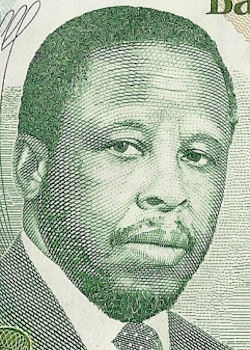Festus Mogae
 Masire stepped down in favor of Festus Mogae in 1998. Mogae is regarded internationally as an exemplary African leader who ensured that the tenet of democracy flourished under his rule, making Botswana a rare political and economic success story on the continent. Mogae took over a country which was already one of the continent's success stories. Its democracy was strong, stable and rooted in the rule of law. Botswana was widely regarded as one of the more effective countries in the world in combating corruption. Mogae was a trailblazer in the fight against the deadly HIV virus in his native Botswana, as well as a champion of the environment and protecting the continent's natural resources.
Masire stepped down in favor of Festus Mogae in 1998. Mogae is regarded internationally as an exemplary African leader who ensured that the tenet of democracy flourished under his rule, making Botswana a rare political and economic success story on the continent. Mogae took over a country which was already one of the continent's success stories. Its democracy was strong, stable and rooted in the rule of law. Botswana was widely regarded as one of the more effective countries in the world in combating corruption. Mogae was a trailblazer in the fight against the deadly HIV virus in his native Botswana, as well as a champion of the environment and protecting the continent's natural resources.
In 1999, a state of emergency was declared in order to remedy electoral anomalies. A writ was issued for the general elections. However, it was discovered that more than 67 000 people stood to be disenfranchised as their names appeared on supplementary rolls that had not been certified (and, were therefore, not in operation), and whose certification after the issue of the writ was prohibited by section 28 of the Electoral Act and only Parliament could remedy the situation. But as Parliament had already been dissolved (and not simply prorogued), only after the declaration of a state of emergency could Parliament be summoned to meet in order to remedy that anomaly. After the emergency was declared, Parliament was summoned and the Electoral Act was amended to allow for certification of the rolls.
Mogae spoke of his crusade to defend the environment at an International Conservation Foundation gathering in 2007. "The future of our planet is dependent on how well we care for the environment and manage our natural resources," said President Mogae. "I will highlight our effort and the challenges we are faced with in the management of the environment and protection of our natural resources in our little Botswana. I should add that the support of the U.S. government, the international community, and the private sector will greatly enhance our efforts."
In October 2008 a foundation dedicated to encouraging good government in Africa awarded its annual prize former president, Festus G. Mogae. He was honored for consolidating his nation’s democracy, ensuring that its diamond wealth enriched its people and providing bold leadership during the AIDS pandemic. The prize, worth $5 million dispensed over a ten year period, with an additional $200,000 annual stipend after that, was established by Sudanese-born, British telecommunications magnate Mo Ibrahim in 2007.
Christiaan Poortman, of Berlin-based Transparency International, said "... Mogae is a man with a very great reputation for being a very responsible, transparent and accountable leader; as a matter of fact, Botswana has a long history... of a very particular type of governance, which generally is perceived to be very much in line with what one would like to see an accountable government look like.... Mogae has embodied that and I think he is indeed a role model that one would like to see followed".
Survival International criticized the Mo Ibrahim Foundation for awarding its achievement in African Leadership' prize to Mogae, who as president of Botswana oversaw what the organization claims was the eviction of Kalahari Bushmen from their rightfully owned land.
The 30 October 2004 general election process confirmed to many observers Vice President Lt Gen (Retd) Ian Khama, Seretse Khama's son, intolerance of dissent in any form. The BDP's primary election process was troubled, and in several constituencies re-runs resulted in an altered outcome. Observers described the primaries as "Moi elections," blatantly stolen by members of the Mogae/Khama faction. News reports alleging that ballots were only cast a second time in constituencies where a candidate from the Khama faction had lost, confirm that this impression -- of sham primaries -- was commonly shared. After the 2004 general election, members of the rival faction led by MP Ponatshego Kedikilwe were almost entirely excluded from cabinet and council nominations, despite the group's considerable numbers in parliament (Ref A). Despite gaining 48 percent of the popular vote, opposition parties accounted for only 3 of 101 nominated seats in local councils, which are appointed by the central government. The independent press interpreted the appointment of three novice politicians with military backgrounds to the cabinet as an indication that Khama places a premium on obedience and loyalty over experience and talent.
Mogae handed over power peacefully in 2009 in what political observers described as a smooth transition after nearly a decade in power.
|
NEWSLETTER
|
| Join the GlobalSecurity.org mailing list |
|
|
|

